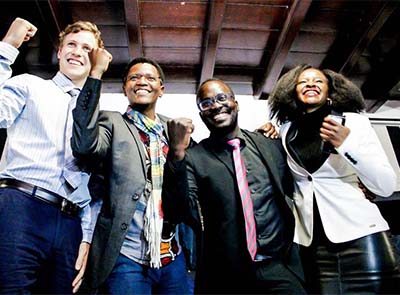The winners of the 2016 #Hack.Jozi Challenge, announced by the City of Joburg and Wits University last night, will scale their businesses to create jobs and help beat real issues they identified in healthcare, education and local government administration in the City of Joburg.
The top three contestants, selected from over 400 entries and a short-list of 10, came up with original digital solutions to tackle obstacles faced by people with chronic conditions, help students who need academic support, and boost efficiency in building plan applications to promote property development in Joburg.
They have been through a rigorous bootcamp, mentorship and development process that began at the end of March, an initiative of the Economic Development Department in the City of Johannesburg and Wits University through its Joburg Centre for Software Engineering.
First prize of R1-million was awarded to Neo Hutiri, founder of Technovera, a technology-enabled service that allows people with chronic conditions to collect their repeat medication in just a few minutes as opposed to waiting several hours in long queues.
First runner-up was the multidisciplinary team that developed Tuta-Me, a mobile application that connects qualified tutors and students, enabling students to receive one-on-one tutoring while empowering tutors to earn or supplement their income.
Second runner-up was awarded to Lomile Mokoka, a qualified architect, who developed eSubmit as an e-solution for a problem she was experiencing first-hand when submitting building plan applications to the municipality.
The runners up have been awarded R350 000 each in support to develop their ideas and establish sustainable businesses.
Member of the Mayoral Committee for Economic Development in the City of Joburg, Ruby Mathang, says that digital technologies are powering the development of cities across the world.
“The #HackJozi Challenge is aimed at driving our smart city agenda while catalysing innovation and development. This year’s winners show how involving citizens in identifying technology solutions to everyday problems is a powerful way improve the efficiency of services, meet residents’ needs and help improve quality of life in Joburg.”
Ravi Naidoo, executive director for economic development for the City of Johannesburg, says that participation in the 2016 challenge increased by well over one third compared to the first round of the initiative held last year.
“We received over 400 strong applications, compared to 140 last year, and eliminating contestants down to the top ten and then the top three as the challenge progressed was far tougher that we anticipated.
“The winning ideas of the 2016 #Hack.Jozi Challenge are scalable and driven by highly motivated and capable young people who were born into the ICT age. Further development of their ideas will see them make a huge difference in helping people in Johannesburg while creating more jobs and economic opportunities as they grow.
“We are also pleased to see that the City of Cape Town and the Department of Water and Sanitation have taken a cue from the City of Johannesburg, to embrace the digital era in their environments and encourage technology innovation competitions as a way to address relevant problems and promote entrepreneurship.”
Professor Barry Dwolatzky, director of the JCSE at Wits University, says that the winners of the challenge do not receive their prizes as a cash hand-out. “They will be closely guided and supported by experienced mentors. The prize money helps build profitable and sustainable businesses that scale, create jobs and produce more pockets of positive economic activity across our city.
“In addition all top 10 finalists will be hosted in the incubator that forms part of the Tshimologong Digital Innovation Precinct in Braamfontein.”
Dwolatzky says the top 10 contestants “pitched their hearts out” and the final choice of the 2016 top three winners was painstaking, and the best ideas were finally selected.
Hutiri, who earned top honours in this year’s challenge, comments: “I used to be a patient collecting treatment from a public clinic. It’s really an unpleasant experience to wait the whole day just to manage your condition. Technovera is a technology solution that improves patient care by ending the indignity and exhaustion of long queues.”
Tuta-Me was founded by Abed Tau, who is a chartered accountant by profession, and Dylan Hyslop, who holds a computer science degree. Tau says their app seamlessly integrates students and tutors to benefit both. “Students are able to find tutors that best meet their needs in terms of subject, area and time. The app also rates the tutors and students as a vital quality control mechanism.”
Lomile Mokoka says that eSubmit is a platform for submitting building plan applications to the municipality. “In my work as an architect, I realized the inefficiencies of manual process when submitting building plan applications. Thousands of building plan applications are received by the city on a monthly basis, and currently, the application process is time-consuming and costly. This also has the unintended consequence of encouraging illegal buildings.”
Naidoo says plans for the 2017 challenge are already underway. “The power of this initiative is only just being unleashed.”

